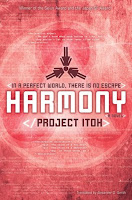 Author: Project Itoh
Author: Project Itoh
Translator: Alexander O. Smith
U.S. Publisher: Viz Media
ISBN: 9781421536439
Released: July 2010
Original release: 2008
Awards: Nihon SF Taisho Award, Seiun Award, Philip K. Dick Award Special Citation
Harmony, by Project Itoh, was originally published in Japan in 2008, winning both the 2009 Nihon SF Taisho Award and the 2009 Seiun Award. Although I was previously unfamiliar with Itoh’s work, I was very excited when the novel was picked up by Viz Media’s Haikasoru imprint and released in 2010 with a translation by Alexander O. Smith. Happily, Harmony has been very well received in English and was recently nominated for the 2010 Philip K. Dick Award. As far as I know, this is the first book in translation and the first Japanese novel to ever be nominated for this award. (The nomination is also particularly meaningful to Haikasoru as the imprint takes its name from Philip K. Dicks award-winning novel The Man in the High Castle.) Harmony is currently the only work by Itoh available in English although a fairly reliable rumor has it that Haikasoru has more Itoh plans in the works. I really hope that is true.
After an unprecedented, worldwide mass suicide, admedistrations across the globe are thrown into turmoil. In a society that views the human body as a vital resource and a public good to be protected at all costs, suicide is an unthinkable crime. The Helix Inspection Agency, a part of the World Health Organization, is charged with the investigation into the incident. For Tuan Kirie, a Helix member playing an important role in the investigation, the event is very personal. She herself once attempted suicide in defiance of the admedistrative system of which she is now an integral part. She watched as one of her friends took her own life during the mass suicides. Her father was one of the original developers of the WatchMe nano- and biotechnologies that allow the admedistrations to function, but which may have also laid the groundwork that would make such a wide-spread tragedy possible.
The most unusual element of Itoh’s writing in Harmony is his use of EML, or Emotional-in-Text Markup Language (which looks very similar to other markup languages such as XML or HTML.) Even if a reader isn’t familiar with markup languages, it is soon obvious what is going on and the EML shouldn’t provide too much of a challenge. Some people might see it as a clever gimmick, but I found the use of EML to be quite effective and integral to the story. It emphasizes many aspects of admedistrative society in both subtle and direct ways: The EML is a constant reminder of the biotechnological advances that have been made; the perpetual recording and surveillance of individuals’ lives, health, and minds is made obvious; emotional states and human desire are shown to have been reduced to data points for clinical observation; the barrier between one person’s experiences and another’s is broken down. I believe EML is critical to Harmony and I doubt anyone will be able to convince me otherwise.
As with any fiction successfully exploring utopia and dystopia, Harmony is extremely thought-provoking in addition to being engaging. It is easy to see the obsessions and neuroses of today’s societies, particularly those regarding health, reflected and taken to the extreme in Harmony’s world. Occasionally, Itoh can be a bit heavy handed, but overall his world-building has taken a logical if not entirely realistic path. Even a near perfect world can’t make everyone happy and the methods used to get there can be terrible no matter how they are justified. The epilogue doesn’t mesh as nicely with the rest of the novel, but it does provide important information, clarifying specific plot elements while still leaving some ambiguity to the story. I enjoyed Harmony immensely—it’s smart, thought-provoking, and has stuck with me for quite some time after finishing it. I really hope to get a chance to read more of Itoh’s work in English.

I’ve not heard of this before, but sounds really interesting *_*
It really is! I love almost everything that Haikasoru publishes. If you enjoy speculative fiction (science fiction, fantasy fiction, horror fiction, and more!) you should definitely check out their books.
http://www.haikasoru.com/our-books/
Harmony sounds interesting, but it also sounds a bit Randian, which I don’t really care for. What do you think about that comparison?
Hmmm…that’s a good question. It’s been a long while since I’ve read any Ayn Rand, so I’m not sure I can answer for certain. I think though that I was more reminded of Huxley’s Brave New World or maybe even Orwell’s 1984 while reading Harmony than I was of any of Rand’s works that I’ve read. There’s also some similarities to Scott Westerfeld’s Uglies series of novels.